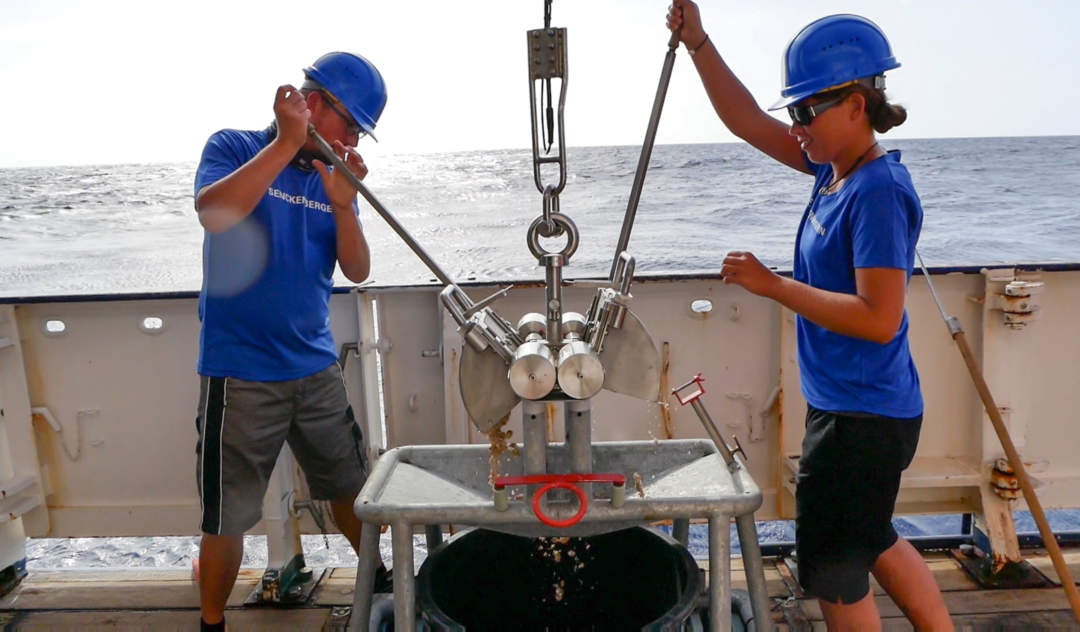
Technical assistance at the DZMB
The technical assistants of the DZMB have many different tasks, and the variety has grown over the year.
Now the spectrum of our tasks includes all technical assignments from the staging of scientific expeditions to archiving and documentation of the samples we process.
Expeditions and logistics
The technical assistants of the DZMB are in charge of the extensive planning and organization of expeditions. This includes the technical as well as the logistic scheduling:
Organizing and purchasing equipment for expeditions
Maintenance and deployment of gear for sampling on board
Coordination of container shipping
Shipping of expedition equipment
We also take part in expeditions on board of our in-house research vessel FK “Senckenberg” or on larger research vessels such as RV “Meteor” or RV “Polarstern”. During these expeditions we support scientists in various work processes:
Deployment of sampling devices
Fixation and cataloging of samples
Processing of samples in the laboratory: sample sorting, taxonomic determination, genetic analysis etc.
News from previous and ongoing expeditions: http://www.deepsea-research.org/.
Sample processing and sample management
A large part of our work includes the processing of marine samples:
Washing, decanting and centrifuging of sediment samples
Sorting samples with the stereo microscope ( e. g. meiofauna )
Cultivation of living organisms ( e. g. dinoflagellates )
Mounting of specimens
Preparation of specimens for genetic analysis
…and the sample management:
Providing external specialists with pre-sorted taxa
Object documentation ( photographic)
Development and maintenance of databases
Genetics
Processing of the (tissue) samples in the extraction laboratory as well as processing of the DNA – extracts in the PCR – laboratory:
DNA extraction (single tube/96-well-plates)
PCR (polymerase chain reaction)
Checking of DNA extracts and PCR products on positive DNA content:
gel electrophoresis and documentation
shipping of DNA extracts and/or PCR products for sequencing
The identification of marine species represents a pivotal component for biodiversity studies and conservation planning.
The aim of the research group “Molecular Taxonomy of Marine Organisms”, funded by the Federal Ministry of Education and Research (BMBF) and the Land Niedersachsen, is to test and develop molecular methods for the identification of the marine metazoan fauna of the North Sea.
One focus of the research represents the building-up of sequence libraries of DNA barcodes (COI) as well as supplementary nuclear markers, which are used for reliable species identifications. In addition to this, next generation sequencing methods are used to analyse enviromental samples while the development of rapid identification systems based on various molecular methods allows a specific and reliable identification of selected species.
Electron microscopy
To be able to see the inner and outer anatomy of microscopic organisms the method of choice is electron microscopy. There exist the Scanning electron microscopy (SEM) and the Transmission electron microscopy (TEM).
For both we do a large part of preparation in Wilhelmshaven.
Preparation of ultrathin sections for electron microscopy
SEM:
Chemical fixation of cells and organisms
Ethanol-dehydration
Chemical drying
Covering of the cells with Gold-Palladium
With the SEM it is possible to document fine outer surface structures of cells, tissues and organisms.
TEM:
Chemical fixation and post-fixation of cells and organisms
Aceton-dehydration
Embedment in artificial resin
Production of ultrathin sections
After contrastation with heavy metals (Pb, U) the slices can be analyzed with the TEM. The results give information about the anatomy and ultrastructure of organs, cells and cell organelles
Further tasks
- Procurement of consumables and equipment
- Supervision of trainees
- Training of student research assistants, graduate and Ph. D. students as well as guest scientists in sample processing
- Assisting in workshops and university courses